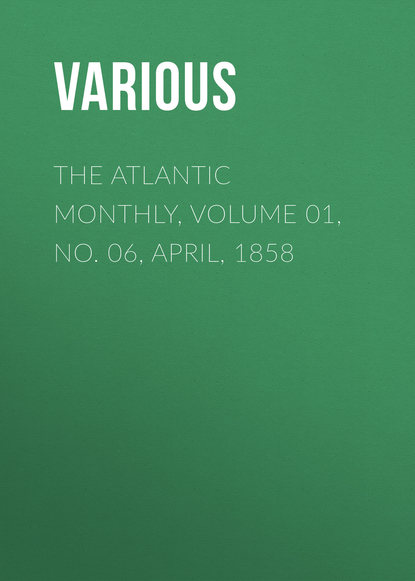По всем вопросам обращайтесь на: info@litportal.ru
(©) 2003-2024.
✖
The Atlantic Monthly, Volume 01, No. 06, April, 1858
Автор
Год написания книги
2018
Настройки чтения
Размер шрифта
Высота строк
Поля
"I know that thou, O morning wind,
O'er Kerman's meadow blowest,
And thou, heart-warming nightingale,
My father's orchard knowest.
"Oh, why did partial Fortune
From that bright land banish me?
So long as I wait in Bagdad,
The Tigris is all I see.
"The merchant hath stuffs of price,
And gems from the sea-washed strand,
And princes offer me grace
To stay in the Syrian land:
"But what is gold for but for gifts?
And dark without love is the day;
And all that I see in Bagdad
Is the Tigris to float me away."
NISAMI
"While roses bloomed along the plain,
The nightingale to the falcon said,
'Why, of all birds, must thou be dumb?
With closed mouth thou utterest,
Though dying, no last word to man.
Yet sitt'st thou on the hand of princes,
And feedest on the grouse's breast,
Whilst I, who hundred thousand jewels
Squander in a single tone,
Lo! I feed myself with worms,
And my dwelling is the thorn.'—
The falcon answered, 'Be all ear:
I, experienced in affairs,
See fifty things, say never one;
But thee the people prizes not,
Who, doing nothing, say'st a thousand.
To me, appointed to the chase,
The king's hand gives the grouse's breast;
Whilst a chatterer like thee
Must gnaw worms in the thorn. Farewell!'"
The following passages exhibit the strong tendency of the Persian poets to contemplative and religious poetry and to allegory.
ENWERI
BODY AND SOUL
"A painter in China once painted a hall;—
Such a web never hung on an emperor's wall;—
One half from his brush with rich colors did run,
The other he touched with a beam of the sun;
So that all which delighted the eye in one side,
The same, point for point, in the other replied.
"In thee, friend, that Tyrian chamber is found;
Thine the star-pointing roof, and the base on the ground:
Is one half depicted with colors less bright?
Beware that the counterpart blazes with light!"
IBN JEMIN
"I read on the porch of a palace bold
In a purple tablet letters cast,—
'A house, though a million winters old,
A house of earth comes down at last;
Then quarry thy stones from the crystal All,
And build the dome that shall not fall.'"
"What need," cries the mystic Feisi, "of palaces and tapestry? What need even of a bed?
"The eternal Watcher, who doth wake
All night in the body's earthen chest,
Will of thine arms a pillow make,
And a holster of thy breast."
A stanza of Hilali on a Flute is a luxury of idealism:—
"Hear what, now loud, now low, the pining flute complains,
Without tongue, yellow-cheeked, full of winds that wail and sigh,
Saying, 'Sweetheart, the old mystery remains,
If I am I, thou thou, or thou art I.'"
Ferideddin Attar wrote the "Bird Conversations," a mystical tale, in which the birds, coming together to choose their king, resolve on a pilgrimage to Mount Kaf, to pay their homage to the Simorg. From this poem, written five hundred years ago, we cite the following passage, as a proof of the identity of mysticism in all periods. The tone is quite modern. In the fable, the birds were soon weary of the length and difficulties of the way, and at last almost all gave out. Three only persevered, and arrived before the throne of the Simorg.
"The bird-soul was ashamed;
Their body was quite annihilated;
They had cleaned themselves from the dust,
And were by the light ensouled.
What was, and was not,—the Past,—
Was wiped out from their breast.
The sun from near-by beamed
Clearest light into their soul;
The resplendence of the Simorg beamed
As one back from all three.
They knew not, amazed, if they
Were either this or that.
They saw themselves all as Simorg,











